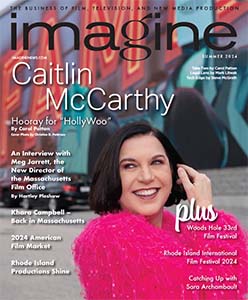 How to take other people’s brilliant ideas and call them your own. Also – how to prevent really crappy ones from ruining your script. Or your life.
How to take other people’s brilliant ideas and call them your own. Also – how to prevent really crappy ones from ruining your script. Or your life.
When’s your happiest time as a writer? When you’ve got the greatest concept for a movie any human brain ever thought of and you can barely contain your excitement and all you’ve got to do is, you know, write it and get it produced and maybe direct it and buy a Lamborghini with your percentage of the net profits?
Ask a mother a similar question. What part of that you-now-have-concluded-or-soon-enough will endless commitment gave you the most pleasure? The nine months of pregnancy, minus the puking? The beatific glow, the choosing of the nursery rhyme wallpaper and perfect name? Ask a father and he might say his greatest pleasure came a little earlier in the process, but it’s an apt analogy. Ideas are fantastic; everybody’s got them. People want to share theirs with me all the time and I invariably disappoint them by responding that I’m good, all full up with ideas of my own, thanks, and then encouraging them to write their story down.
Is that when you’re your most contented, when you’re deep into the writing, dreaming up characters and scenes and reciting bits of dialogue to your dog? That’s a good feeling, too. I have it all the time; I’ve had it working on our script, Beautiful Women, and I don’t even have a dog to concur how excellent it is.!
I’m big on dreams. It’s the dream aspect that drew us here in the first place – right? – the childlike excitement of playing Let’s Pretend. When my daughters were small, I could hear them creating stories like crazy; it was magical and distracting and, frankly, kind of irritating since some of their stories were way better than mine. All of their characters were named Friend and I admired their economy. “Oh, Friend, would you like some tea?” “Yes, Friend, with cream and lots of sugar, please.” (They were raised in a sugar free household; what can I say?)
But I’m up in my office thinking, Right, keep it simple, stupid. At the end of the day, meaning the beginning of the night when we’re most apt to read a book or see a movie or play or, recently, something scintillating on TV, it’s the simplest stories that most affect us. You or your dog can argue that Breaking Bad is a fabulously complicated and artfully constructed prismatic view of our culture gone to hell in a Meth lab. I’d say it’s about loneliness and fear and feeling unworthy; it’s about longing and lust and loss.
Vince Gilligan looks pretty happy picking up his Emmys and posing for pictures, but I suspect he’s had his moments of despair. It comes with being a writer. At some point we have to share our masterpiece with other people and brace ourselves for their reactions. If it’s our spouses or kids or dogs or agents, pardon any redundancy, that’s fine; they’re well-meaning and it’s not their fault that they’re a little dim and don’t get it; we’ll still love them. But there are other, louder voices that will join the chorus and sometimes they sound a little – what’s the word? – let’s say it nicely as our mothers taught us: lunatic.
Notice I called their input Love Notes. I work, always, I have to, from the assumption that
anyone interested in facilitating our projects, any producer, actor, director, cameraman and the guy at the M&M table, has our and the movie’s best interests at heart. And sometimes the ideas that occur to them come from truly caring and provocative places and, if we keep our minds open, we can profit from them. But, let’s face it, Friend, while we’re having tea with cream and lots of sugar: they’re not all geniuses. And they don’t all understand.
I’ve been involved with films financed by real estate moguls and sports teams’ owners and who, you might ask, qualified them to have opinions? That would be Washington, Jefferson and Franklin and not merely as the father and randy uncles of democracy. Sometimes the person putting the most cash on the table has the most power and what have you got?
The story. And you need to stick to it.
Which means conjuring the strength to defend every moment, decision and semicolon, and finding the grace to listen to other people’s thoughts and theories? You won’t win every time; I can promise you that. But you’ll learn. I was the first writer on a movie called CONTACT, brought in to “break the back of the book,” also known as breaking my back. It’s like being the guy the commanding officer sends out to check for mines on a battlefield. I found a whole bunch of them and got fired but my script was fantastic; it was a thousand times better than the movie that eventually got made, written by my seventh or eighth successor, but that’s irrelevant.
What I learned was to love the process a little better, to embrace the collaboration that is
moviemaking. I also learned to build my own company, write novels and songs and not have to take notes from anybody. Those are luxuries we have to earn. And we all want our movies made so we learn balance.
We learn, in the course of time – don’t we? – to be better husbands and parents and soul mates. When uglier idiots than anyone in the way of our projects are setting bombs off or, say, running for Congress, we learn perspective; it’s only a movie. But it’s our movie, so we learn to listen. And we learn to write more clearly. Are people’s questions predicated on their not understanding our intent? Then we need to clarify it. Sometimes, we’ll discover, we’ve obfuscated our objectives with our passion.
So, back we go to the tea party and to take our lumps (of sugar). There are other ways to sweeten the pot, agave, rice syrup, generosity of spirit and a firm belief in what you and you alone have created. You wouldn’t be getting love notes if you hadn’t written a script worthy of response. You can do it, Friend.
Ernest Thompson, an actor, director and the author of more than thirty screenplays, including the classic ON GOLDEN POND, for which he won an Oscar, a Golden Globe and a Writers Guild Award, offers private coaching and script analysis, weekend workshops at his farm in New Hampshire (ad page 21), and also teaches advanced acting classes in Boston and elsewhere. For more information, visit
www.ErnestThompson.us.




